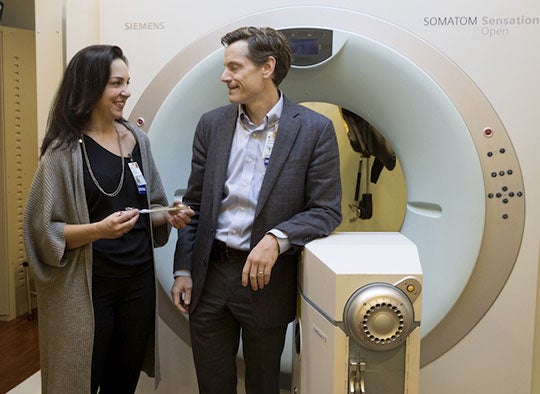
Shayna L. Showalter and her husband, Timothy Showalter, have received $1.8 million to test their new approach to treating early-stage breast cancer.
Husband-and-wife doctors at the UVA Cancer Center have been awarded more than $1.8 million from the National Institutes of Health for their effort to improve radiation therapy and breast surgery for patients with early-stage breast cancer.
Radiation oncologist Timothy Showalter, MD, and breast cancer surgeon Shayna L. Showalter, MD, are leading an interdisciplinary effort to evaluate a technique they have developed at UVA called Precision Breast Intraoperative Radiation Therapy (IORT). Precision Breast IORT seeks to improve on conventional breast IORT by making it more targeted, more powerful, more personalized and potentially more effective.
“Our team at UVA is pioneering the use of advanced, image-guided brachytherapy for breast IORT,” said Shayna Showalter, co-principal investigator. “We have been working on this new method since 2014.”
“The Precision Breast IORT program leverages UVA’s unique CT-on-rails brachytherapy suite to address the technical limitations of other IORT techniques,” said Tim Showalter, co-principal investigator. “This work represents a unique collaboration between surgery and radiation oncology, with important support from the Health System.”
Precision Breast Cancer Treatment
Precision breast IORT adds high-powered imaging to radiation therapy to better direct the radiation, and it effectively doubles the dose patients can receive to the tumor bed when compared with conventional IORT. IORT reduces weeks of radiation treatments into a single dose given at the time of breast-preserving surgery.
The UVA doctors and their colleagues wanted to find ways to better tailor the cancer treatment to each patient, so Precision Breast IORT incorporates advanced CT image guidance to allow doctors to avoid radiation to healthy tissue and to spare the heart, lungs and other organs. The researchers hope the approach will produce improved outcomes in terms of quality of life, the effect on the immune system and the cosmetic appearance of the breast.
The researchers established the safety and feasibility of Precision Breast IORT in a phase I clinical trial. They are now conducting a phase II trial at UVA and Thomas Jefferson University Hospital in Philadelphia to evaluate the overall effectiveness of Precision Breast IORT as well as the effects on the immune system for both IORT and traditional whole-breast irradiation.
With their new, five-year grant, the Showalters plan to evaluate Precision Breast IORT in terms of:
- Five-year breast cancer recurrence rates. They hypothesize that those rates may be lower than with conventional IORT.
- The effect on the immune system. They want to see if Precision Breast IORT can avoid the immune-dampening effects of radiating the entire breast.
- How it compares to other treatment options. They plan to evaluate its effect on the risk of cancer recurrence, its cost effectiveness and other factors, and how those outcomes compare with existing options.
“Our research will address fundamental questions about the impact of radiation therapy on the immune system for cancer patients,” Tim Showalter said. “We will also provide evidence needed to understand how Precision Breast IORT compares to other radiation options, an important foundation for disseminating our findings.”
“The clinical trial of Precision Breast-IORT has been very well received in the region, with rapid patient enrollment, and the entire team is to thank for that,” Shayna Showalter said. “It is so rewarding to be able to advance the field through such a patient-centered research program.”
About the Breast Cancer Grant
The NIH grant, R01 CA214594-01A1, comes from the NIH’s National Cancer Institute.
Key personnel in the research team include the Showalters, Gina Petroni, Timothy Bullock, Adam Berger, Nicole Simone, Jennifer Lobo and Dena Snyder.
Learn more about treatment options for breast cancer available at UVA.
To keep up with the latest medical research news from UVA, subscribe to the Making of Medicine blog.
Filed Under: Media Highlights, Research

Comments